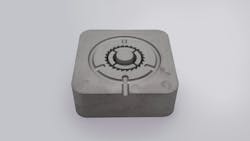Angstrom Group acquires tooling technology provider Mantle
Angstrom Group, a full-service supplier to automotive and industrial OEMs, has acquired Mantle, which manufactures technologies for making injection molding tools.
The acquisition aims to expand Mantle’s reach and accelerate the adoption of its automated toolmaking technology across global manufacturing markets, creating efficiencies and opportunities for molders, mold makers and OEMs, according to a press release.
Mantle’s technology combines metal 3D printing and CNC machining to produce high-quality injection mold tooling components faster and more cost-effectively than traditional methods.
“With Mantle now part of the Angstrom family, our goal is clear — to industrialize this breakthrough metal additive technology and make it broadly accessible,” said Nagesh Palakurthi, founder and CEO of Angstrom Group, headquartered in Southfield, Mich. “By offering financing solutions and integrated tool design services, we will help customers adopt and benefit from advanced metal 3D printing — transforming manufacturing at scale.”
“This is a very exciting day for Mantle and our customers. The Angstrom Group has a stellar reputation in the manufacturing industry, and by combining forces, Mantle will be able to further our mission of revolutionizing toolmaking for plastic part manufacturers globally,” said Ted Sorom, CEO of San Francisco-based Mantle.
Angstrom Group’s investment will help Mantle expand production capacity, strengthen its partner network and accelerate deployment of its manufacturing systems.
In a 2021 interview with Plastics Machinery & Manufacturing, Mantle’s chief commercial officer, Paul DiLaura, explained the advantages of Mantle’s TrueShape technology in creating a mold.
“Mantle is normally used to print some of the most complex mold components, such as inserts. These inserts are typically the most expensive and time-consuming aspects of a mold and is where Mantle adds the most value,” he said. “However, there are other components of the mold, such as a mold base, runners, ejector pins, etc. that are normally made conventionally. Our inserts are then assembled with the rest of the mold base.”
Mantle's 3D printer extrudes a metal slurry with the consistency of toothpaste that builds up the part layer by layer, and the layers are heated and dried after they're deposited. The resulting part is then CNC machined using tooling integrated with the printer to create the fine features and accuracy needed for molding.
The TrueShape, like many 3-D printers, can create parts with shapes, such as conformal cooling channels, that could not be produced via conventional means.
DiLaura said in 2021 that Mantle was targeting three groups with the technology: mold makers, brand owners of injection molded parts and injection molders that either make their own molds or would be interested in being able to replace or repair inserts in-house. It can also allow part makers to tinker with their designs and produce prototypes more quickly with different inserts.
“In the supply chain, mold makers can be more responsive to their customers, can be located geographically closer to their customers. A lot of companies get their molds made overseas, and this allows for some onshoring of mold making, to make it more efficient and more cost-effective,” DiLaura said.
In its weekly newsletter, Wohlers Associates, a consulting firm focused on additive manufacturing, said, "Mantle’s principal advantage is speed, especially in producing prototype tooling. The company reports that its process can also be used for production tooling, suggesting that time savings extend to higher-volume manufacturing. Quick-turn tooling enables faster iteration at the design stage and shorter production runs, giving users a clear time-to-market advantage."
The Wohlers analysis continued, "An interesting aspect of the acquisition is that Angstrom appears to have acquired Mantle primarily for its own competitiveness as a mold maker. It is not yet clear whether Mantle systems will continue to be commercialized for other injection molding companies."
About the Author
Lynne Sherwin
Managing Editor
Managing editor Lynne Sherwin handles day-to-day operations and coordinates production of Plastics Machinery & Manufacturing’s print magazine, website and social media presence, as well as Plastics Recycling and The Journal of Blow Molding. She also writes features, including the annual machinery buying survey. She has more than 30 years of experience in daily and magazine journalism.
